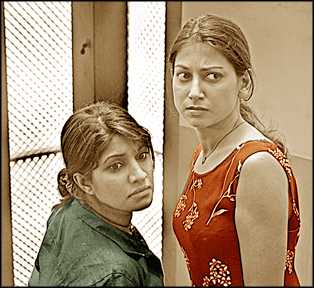"Akasa Kusum" - Again

"The way was long, the wind was cold,
The Minstrel was infirm and old".
"LAY of the Last Minstrel" Sir Walter Scott
(1805)
Sir Walter Scott's Minstrel, in his sun-set days, finds a tortuous
road winding in front of him. A sharp freezing wind buffets his frail
frame.
It is quite reasonable to assume, that, while being tortured by the
inclement weather and the rough terrain, he recalls with a bleeding
heart, those joyous days of his youthful past. He has grown old,
regaling elitist merry-makers, in cavernous halls of imposing castles,
while those men and women, feasted sumptuously, at boards groaning under
the weight of choice food and beverages.
The resounding songs are now hushed. The lusty ovations brought on by
drunken euphoria are now silent. Bereft of every thing, the aged
Minstrel, is left to his troubling loneliness. The memories of those
glorious, expansive times can engender only frustration, pain and pangs.
In his latest film "Akasa Kusum" (Flowers of the Sky) Director
Prasanna Vithanage has been able to capture unerringly, the fine nuances
of the profound frustration experienced by ageing "Minstrels" of all
hues, everywhere and at all times.
 |
|
A scene from the
movie |
This situation of lonely frustration, is common to most artistes,
whose youthful and glamorous days were lived in the limelight of fame
and glory. They were adored by fans. Doting admirers made their lives, a
glittering carnival. The frustration of the ageing stars of the silver
screen can be deeper and more painful. The film star occupies a space
that masses focus on avidly. Their alluring presence in this medium
makes them universal darlings. Once their glory had faded and they can
no longer thrill the fickle hearts of the pleasure seeking hoards, they
are swept pitilessly into a nook of history.
There, they suffer agonies, making a vain effort, to fill the present
moment with the tattered memories they still cherish and cling onto
desperately. Director Prasanna Vithanage, makes a sustained cinematic
effort, to probe the psyche of a female film star, who has been reduced
by unkind time, to a life of exasperated frustration. Her feminineness
compounds her frustration, adding complex layers to her deep despair.
Director Prasanna Vithanage, extensively reputed for his note-worthy
cinematic creations, feels challenged by burning contemporary issues.
While others would shun them, and would avert their gaze, Director
Prasanna Vithanage, meets them head on. His "Purahanda Karuwala" (Death
on a Full Moon Day), Ira Mediyama (August Sun) are specifically his
cinematic responses, to the challenges paused by contemporary issues.
In Akasa Kusum (Flowers of the Sky) he presents a film-treatise that
delves deep into the shattered soul of a former Queen of the
silver-screen. The title of the film "Akasa Kusum" evokes a sense of
sadness in my mind. To me, it has the implication of an unreachable
dream. Flowers are beautiful, but they are out there in the sky, far
beyond our grasp. This image symbolizes the glory of the by-gone days,
which the fading Queen can never hope to embrace again. As explained in
the Director's Note, by Prasanna Vithanage, the making of this film was
prompted by a sense of obligation, specific to his profession. A
prevailing assumption, according to him is, that a film-maker should
create at least one film on his profession.
He deployed his camera and his Directorial urges, towards his own
world - cinema - and discovers Sandhaya Rani, a faded Queen of the
silver screen. In assigning this role to Sri Lanka's Cinema Queen -
Malani Fonseka, the director made a faultless selection, as confirmed by
international awards, she was able to win for this portrayal. In her
introductory appearance, she is preparing pastries to be sent to shops.
She is confined to a kitchenette which seems quite crowded. In this
restricted space too, she manages to communicate a sense of dignity.
This is reinforced by the deference implicit in the attitude of others
in the household, towards her. Her adeptness in character-portrayal gets
amply articulated, when she manages to do whatever trivial thing she has
to do betraying evidence of a momentum, derived from a richer and more
expansive past.
Her soul is emotionally tight - packed. This inner disquiet is
rigidly under control. Her occasional drink, is the only sign the
viewers have as a momentary relaxation of her tensed up interior. On one
occasion, she has on out-burst of explosive temper. But it passes in a
brief while. In her quiet and sequestered life, she has allowed a slight
concession. She rents out a room in her house, as a kind of clandestine
haven for the sexually marginalised. Here too, the concession is given
only to film and television stars.
One particular person, who utilises this emotional 'facility' is
young and popular film star Shalika, played with a satisfying mixture of
mischief and innocence, by Dilhani Ekanayake.
Her entry into Sandhaya Rani's life, stirs a minor re-awakening in
the mind of that faded cinema Queen. It works as a vague rumour of a
re-emergence into limelight. She plugs into short appearances in brief
film presentations, with a childish enthusiasm. A scandalous past, that
she had kept concealed with an effort, enters into her life as a driving
force. Early in life, to achieve stardom, she gave up her family, as the
Director who patronized her desired to project her image as a virgin
star.
The child given up, by her to enable her to reach star-level, has now
grown up and is relentlessly bent on plaguing her. Sandhya Rani's
abandoned daughter Priya, is a hostess at a Kara-Oke night club, where
pleasure at a variety of levels of marketed. In cinematically
registering the life at this lower depth, Director Prasanna Vithanage
has utilized his film resources with a surprising lack of inhibition.
The role of daughter Priya, is quite competently portrayed by Nimmi
Harasgama, whose film presence is always impressive.
When the film reaches this stage Director Prasanna Vithanage ties up
the viewer in a tricky knot. Whose rights should we uphold? Does Priya
have a right for so independent a way of life, with no regard whatsoever
for her feelings as a lonely mother? Does Priya have any human right to
punish her mother, for the crime she committed against her daughter by
abandoning her to loveless life, to achieve her personal promotion to
astral status?
The story, from this point on, ceases to be just the tale of deep
frustration experienced by an ex-cinema Queen. We enter into a moral
arena, in which we may at times be tempted to question seriously the
ethical and moral correctness of Sandhya Rani's behaviour.
Director Prasanna Vithanage, propels the story-line forward at a
low-key pace. But, he succeeds eminently in involving the viewer at a
whole series of levels. An overpoweringly tragic conclusion to the film
is averted by Sandhya Rani's gesture in investing in the future, by
adopting her daughter's child. The highest acting kudos, should of
course, be awarded to Malini Fonseka for her Sandhaya Rani. Her role
touched several layers of implication. Nimmi Harasgama (Priya), Dilhani
Ekanayake (Shalika), Kaushalya Fernando (Mallika), Jayani Senanayake (Leela)
and Samanali Fonseka (Bunty) substantially enrich the authentic feel of
the story. Director Prasanna Vithanage's challenging involvement in
burning issues, and throbbing problems of life, will always keep Sinhala
cinema, nourished.
|

